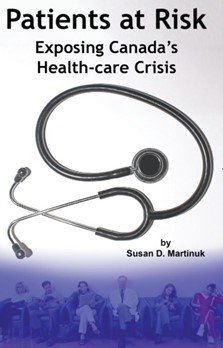There is only one taxpayer pool. Whether we are taxed by the provincial or federal governments, it all comes from one increasingly small pocket.
The federal government has constitutional health care sovereignty over:
- Quarantine;
- The military;
- Indigenous people;
- Federal prison inmates; and
- Federal employees working overseas.
The provinces have constitutional sovereignty over all other public health care.
The federal government created a Canada Health Act that infringes on provincial autonomy by attaching unconstitutional regulations for its offer to help fund provincial health care. As a result, the federal government has created a bureaucracy to administer health care funding. Each province has created a huge bureaucracy to administer health care funding.
Our healthcare systems are budget and bureaucrat driven not public needs driven. Provinces run the schools for doctor and nurse training. They have not trained (or hired) sufficient numbers to fill our needs.
We need the federal government to transfer tax points to the province equal to 50% of the current provincial health care budgets, rescind the Canada Health Act and stay out of healthcare delivery not in its jurisdiction.
Public hospitals and health care facilities must be administered from within by experienced professionals who balance the needs of staff with budget constraints. Politicians and their bureaucrats have starved the system for decades and rebuilding to meet our needs will be expensive.
We must open the door to private hospitals and health care facilities. To do so, we must establish the true costs of public facilities by taking into account the construction and maintenance costs of buildings, property taxes that would be levied on a private facility and tax write-offs allowed for public facilities to establish the true costs of services provided.
We have a scale of costs for various procedures, such as an appendectomy or knee replacement that needs to be updated with the above factors. Once established that will be the fee provided for the same services delivered by private facilities.
Public facilities will have competition for the first time ever. Inefficient management will become apparent. Public facilities can learn from the private sector.
When millions of Canadians cannot access a family doctor, people are waiting for approved medical procedures for months, and ERs are closing due to doctor and nurse shortages our health care systems are on the scrap heap.
We have endured four decades of provincial and federal politicians and bureaucrats pointing fingers, posturing, making promises and assuring us that the systems are working while they allowed the system to fail through neglect. Governments have a healthcare mindset that created a crater where our healthcare systems should be.
Here’s just one area of many eye-opening statistics that Susan Martinuk, a researcher and former Calgary Herald freelance columnist, exposes in her book Patients at Risk: Exposing Canada’s Health-care Crisis:
“Various studies have declared Germany to have the top-ranked (or almost top-ranked) health-care system and copious amounts of data exist to prove that it deserves this rank. Of course, this raised the question — what does the best health-care system (Germany) have that one of the worst systems (Canada) does not?” asks Martinuk, in the book published by the Frontier Centre for Public Policy.
There is one striking difference between the two countries: Canada has 10 times as many health-care administrators as Germany, even though Germany has twice the population of Canada.
This is a glimpse at their respective ratios of healthcare bureaucrats to populations: Canada has one healthcare administrator for every 1,415 citizens. Germany: one healthcare administrator for every 15,545.”
We had approximately 28,800 healthcare administrators in Canada overseeing deterioration of the systems they are responsible for. Administrative bureaucracy has grown while the number of healthcare professionals delivering services has diminished. The incompetence is staggering.
The incompetence is staggering. We must create independent agencies reporting to the legislatures to administer healthcare. Primary administration must be in the facilities where there can be an ongoing dialogue with the medical professionals who deliver care.
Healthcare facilities have to be worker-friendly environments where providers and support staff are recognized, respected and valued rather than abused and stressed. Family physicians have to be recognized and paid for the vital role they play in managing their patient’s health care needs.
We cannot accept continued political bickering and bitching. The failure of politicians to manage healthcare is unacceptable.
The Premiers have a challenge. We have the most expensive healthcare systems in the world with the worst level of public service. They have to scrap the bureaucracies and create a businesslike approach that delivers the healthcare services we need.
John Feldsted is a political commentator, consultant & strategist based in Winnipeg, Manitoba



